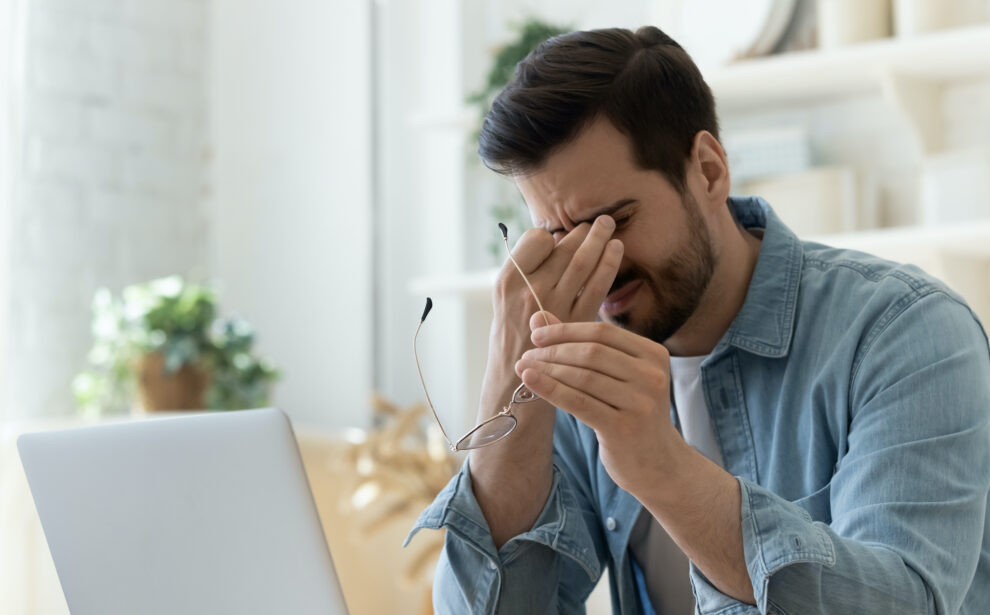
Do you have dry eyes? If you’re experiencing symptoms like dryness, itchiness, or irritation, it could be because of dry eyes.
The eyes make two kinds of tears: lubricating tears and reflex tears. Lubricating tears are produced slowly and steadily during the day. These tears are composed of mucus, oil, and water.
Each component helps to nourish and protect the surface of your eye, ensuring you can see clearly. The second kind of tear, reflex tears, cannot lubricate your eyes correctly.
These tears flood your eyes in an emergency if the eye becomes irritated or suffers an injury. Your eye might create reflex tears if you accidentally get dust or particles in your eye, if you’re in a smoky environment, or if you scratch your eye.
Reflex tears will fill your eye and spill out in large quantities that your tear drainage system cannot handle, leading them to fall down your face. However, another reason for reflex tears is if your eyes become irritated because there are not enough lubricating tears to keep them moisturized. You likely have dry eyes if your eyes cannot produce enough lubricating tears.
Although the most well-known symptom associated with dry eyes is dryness, other signs you may experience include:
Many things can cause dry eyes, including:

If you think you could have dry eyes, the next step is to schedule an appointment with your eye doctor at Raleigh Ophthalmology. During this appointment, they will examine your eyes with magnifying instruments for signs of the condition. They will also measure the rate of your tear production and how long it takes for your tears to evaporate between blinks. They may also check for small, minute scratches on the front surface of your eye that dry eyes can cause.
They do this by using special eye drops called fluorescein or Rose Bengal. If you’re diagnosed with dry eyes, your eye doctor at Raleigh Ophthalmology will determine what’s causing them before developing an appropriate treatment plan to relieve your symptoms.
There are several ways of treating dry eyes. However, the way your eye doctor at Raleigh Ophthalmology treats your dry eyes will depend on the cause and severity of their symptoms. Treatment options for dry eyes at Raleigh Ophthalmology include:
Artificial tears and eye drops are among the most common ways of treating dry eyes. Artificial tears and eye drops come in several forms, including a liquid form, longer-lasting gel, and ointment drops, often best when used at night.
You can find most brands of artificial tears over the counter. However, ask your eye doctor at Raleigh Ophthalmology which kind of eye drops they recommend for treating dry eyes.
Not all eye drops are created equal, as some contain preservatives. Eye drops and artificial tears without preservatives are often recommended if you’re sensitive to preservatives.
If you’re experiencing dry eyes, using artificial tears or eye drops can be a helpful way of reducing irritation and increasing lubrication in your eyes. You can use artificial tears and eye drops several times a day or as needed to give you the necessary relief.
Your eye doctor at Raleigh Ophthalmology will let you know how often you should be using eye drops and artificial tears to help you achieve the most relief.
Another way of improving dry eye symptoms is practicing good eyelid hygiene. You can do this by keeping your eyelids clean.
You should gently wash your eyelids daily with a solution like baby shampoo or facial cleanser. This will help to remove any built-up debris or particles that may be causing irritation or dry eye symptoms.
Use a warm compress as a wet washcloth and put it on your closed eyelids for 5 minutes daily. Using a warm compress will help remove any blockages that may have built up in the meibomian glands of your eyes, giving you needed relief if you’re experiencing symptoms like irritation.
Your ophthalmologist may recommend punctal plugs if you have more severe dry eye symptoms. Punctal plugs are small devices about the size of a grain of rice and are placed into the tear duct of your eye, called the puncta.
Using punctal plugs helps keep the surface of your eye moister and more comfortable while ensuring that your tears cannot evaporate too quickly. Depending on your dry eye needs, they come in both temporary and permanent forms.